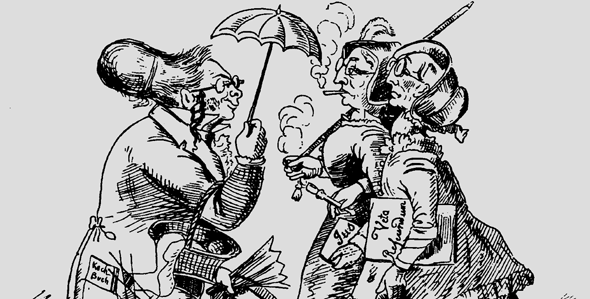
The first women to study at the university: from the 1860s into the 1920s
In the nineteenth century, while women were largely excluded from higher education, Switzerland became a European leader in breaking these barriers. The University of Basel, however, did not keep pace with this development.
It is initially surprising that Switzerland was at the forefront of promoting women’s right to education in Europe. Developments in women’s emancipation, such as political equality, were particularly slow here and lagged significantly behind neighboring countries. Switzerland’s pioneering role cannot primarily be traced to internal developments. Instead, it was imposed from the outside: in the early years of women students at the university, most came from abroad, particularly from the Russian Empire. It was rare for women from Switzerland to study at the university.
The Russians pave the way
In Russia, various reform movements recognized education as a central driver of social progress. The women’s movement strongly advocated for the improvement of women’s education, and women had been allowed to attend lectures since the 1850s. But changing political conditions – a numerus clausus was introduced for Jewish students, and after student unrest, the University of Petersburg banned women from admission in 1863 – meant that women who wanted to study had to seek universities outside the Russian Empire from the 1860s onward.
Switzerland was particularly suitable option: a young nation-state that had offered refuge to many political exiles in Europe and become an important center for various oppositional movement from Russia.
Students in Russia – men and women – were well apprised of these developments.
Particularly at Switzerland’s new universities, founded under the banner of liberalism, an open attitude toward women students and those forced into exile was widespread.
Many professors were themselves political refugees who did not see the strong influx of foreign students as a problem.
The cartoon “Ehmann-cipation” depicted above – a pun that roughly translates as “man-cipation,” referring to a woman’s husband – published in the satirical magazine Postheiri in 1868 addresses the topic with antisemitic undertones. It operates with two central elements: the fact that many women students from the Tsarist Empire were Jewish, and the stereotype of the alleged femininity of Jewish men, contrasted with the supposed masculinity of the (Jewish) women striving for education. The title “Ehmann-cipation” alludes to the emancipation of Jews, i.e., their equal rights in Switzerland, which were enshrined in the federal constitution in 1866.
Basel hesitates
In the 1860s and 1870s, women were allowed to study and take exams in Zurich, Bern, Geneva, Lausanne, and Neuchâtel. However, in Basel, regular access was initially denied, and applications for individual exemptions were rejected by the university authorities.
Movement in the matter only came in 1889: when Basel citizen Eduard Frey requested admission for his daughter, professors were asked for their opinions. The majority were fundamentally against admitting women. In addition claiming that student morality would be compromised, their arguments also reflected discriminatory attitudes: that women were unfit for study and science because of their “nature,” that is to say, their physical, emotional, and intellectual traits.
The political authorities, however, did not feel bound by this survey of opinions. In March 1890, Basel’s Governing Council decided to “experimentally” admit women to study. This decision against the faculty was influenced by certain conflicts between university and political authorities, as well as the fact that the applicant held Basel citizenship.
Admission was restricted, though, to women who had received their schooling in Basel. Access remained largely blocked for most foreign women. This effectively created a barrier to women students: Basel played no part in the boom of women students before the First World War. While Zurich, Bern, Lausanne, and Geneva each enrolled between 300 and 600 women students, the University of Basel enrolled just 15. Legal provisions allowing women students were established relatively late in Basel, compared to Switzerland, and were particularly restrictive in excluding foreign women.
A barrier opposed to women’s emancipation
This special development in Basel was partly due to the conservative nature of a long-established university where innovations were slower to take hold compared to the newer, more liberal institutions. The clause prohibiting women students from abroad was a response to specific concerns raised in the faculty survey. Several professors complained about the particularly poor preparation of foreign women. Others exhibited attitudes clearly opposed to women’s emancipation. Many women students from Russia embraced social reformist or revolutionary ideas, making them an ideal target for male anxieties: as intellectual women with political interests, they doubly defied prevailing gender norms. “Hyper-emancipated” was the common, pejorative term. One professor noted that the “excesses of proemancipation zeal” he expected from the Russians were “not to be feared from Swiss women, and especially not from Basel women.”
In 1914, the Grand Council debated the issue of women’s admission. A motion by Fritz Hauser sought to strike the clause prohibiting women from abroad, but the council decided only to relax it. Foreign women with external certificates would now be allowed to enroll with the faculty’s approval. It was not until the University Act of 1937 that the special status of foreign women was abolished. Men and women, from Switzerland and abroad, now enjoyed equal legal access to higher education.


